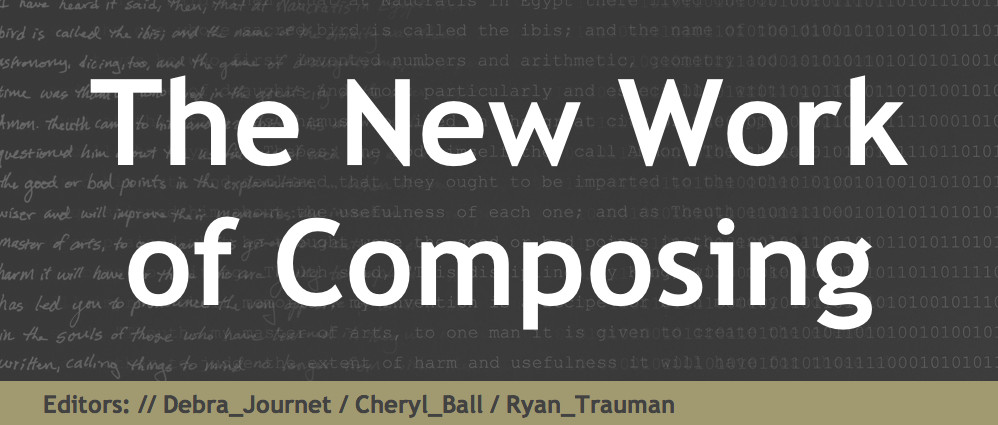
Introduction
Summary
Reflections

Eds. Debra Journet, Cheryl Ball, and Ryan Trauman. Utah State University Press/ Computers and Composition Digital Press, 2012.
ISBN: 978-0-87421-888-6
The collected projects in The New Work of Composing
can be organized in a traditional table of contents format based on hierarchy, but there are also alternative organizations based upon thematic groupings or random placement. I review the individual productions here according to the traditional table
of contents for clarity, although this denies the intertextuality of the collection. I encourage those who are interested to explore the four theme collections (New Authors and Authority, New Strategies for Composing and Producing, New Scholarly Genres, and
New Spaces and Ecologies) or to explore and curate a personal set of themes and connections.
Danielle Nicole DeVoss' website-based article
"Mothers and Daughters of Digital Invention: Women, New Media, and Intellectual Property" examines how women have been excluded from patriarchal technological histories. She argues that women are able to use digital networks in order to resist formalized
intellectual property laws, which were previously used to marginalize women and their contributions.
"Where Ya At?: Composing Identity Through Hyperlocal Narratives",
an extensive blog created by Devon Fitzgerald Ralston, explores how people compose themselves using narratives of place. Ralston examines how the increased intervention of digital technologies such as web-based social
media, cell phones, and even GPS are causing users to develop hyperlocal communities, identities, and content.
"Re-inventing Invention:
A Performance in Three Acts", created by Bre Garrett, Denise Landrum-Geyer, and Jason Palmeri, plays with the theory, process, and application of invention as juxtaposition. By examining the embodied and social aspects
of invention alongside the arrangement affordances of digital technologies, the authors argue that "messy" productions and processes can provoke new meanings and connections.
Morgan Gresham and Roxanee Kirkwood Aftanas' collaborative website
"Not Your Mother's Argument: The Second Shift and the New Work of Feminists Composing in a Digital World", reflects the difficulties of producing multimodal digital compositions in addition to the other expectations associated with research, teaching, service,
administration, motherhood, and feminism. Gresham and Aftanas present a non-linear piece complete with tangents that the reader may explore at will.
Valerie Kinloch's WordPress blog,
"Politicizing, Placing, and Performing Narratives of Gentrification in an Urban Community", investigates the impact digital technologies and urban gentrification have had on the identity and literacy development of African American youth in Harlem. Through
digital technologies, participants Phillip, Khaleeq, Kim, Samantha, and Mr. T share their personal narratives of literacy, place, and activism as they confront the misrepresentations also made possible by these technologies of their community and home.
In
"Symbolizing Space: Non-Discursive Composing of the Invisible",
Joddy Murray questions how composing and reading must change given the changing space of new media. Murray posits that space is itself a text, and that it is necessary to consider how embodied interactions with digital and "real" space will impact meaning-making.
The Normal Group, a group of undergraduate students, contribute their perspective on composition research in
"Talking Back to Teachers: On Undergraduate Multimodal Research". The Normal Group confront the one-sided conversation composition scholars tend to have about students rather than in dialogue with students. They also tackle issues of digital pedagogy and
position students as co-contributors to digital scholarship.
Responding to the simultaneous issues of increased academic production and inconsistent standards for evaluating digital productions, James P. Purdy and Joyce R. Walker argue for a focus on scholarly activity over form in "Scholarship on the Move: A Rhetorical Analysis of Scholarly Activity in Digital Spaces". Through an examination of the formal aspects within various digital productions, the authors reinforce the scholarly value of digital texts according to "traditional" academic standards while also recognizing the unique advantages of intertextuality and multimodality possible.
The new media art installation "Experience, Embodiment, Excess: Multimedia[ted] [E]vsiceration and Installation Rhetoric", created by Jacqueline Rhodes and Jonathan Alexander, questions the role of the body, space, and rhetoric in the composition process. Since material presence changes in digital interfaces, Rhodes and Alexander examine how technology will challenge the legibility of normative textual and somatic bodies.
The part scholarly article, part Flash video interpretation production "No Theory but for Practice: Born, Multimedia, & the Avant-Garde" by Anmarie Trimble and Jennifer Grotz addresses the web journal Born and the development of a multimedia poetics in order to answer the influence of medium on poetry and poetry on the medium. The authors reflect on the challenges, tensions, and possibilities involved in the collaboration and competition of multiple media present in a single production, and they argue that such genre-blending of multimodal productions will shape the future of the arts.
Matthew W. Wilson, Curtis Hisayasu, Jentery Sayers, and J. Jame Bono examine metadata as a process of composition and revision in "Standards in the Making: Composing with Metadata in Mind". The interdisciplinary backgrounds of the authors facilitates a discussion of the creation of standards regarding how to interpret information and account for the multiple possible readings of metadata.